Michael Holding on Black Lives Matter, racial injustice and his disdain for politicians
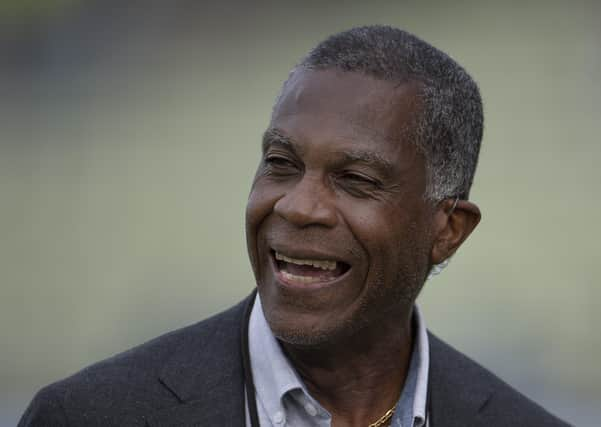

MICHAEL Holding is indignant when it is ventured, naively, that he should seek a platform in Parliament to pursue his crusade against racial injustice. “No thanks,” he tells The Yorkshire Post with the same conviction that became his hallmark, first as a fast bowler, and, more recently, as the social conscience of the sporting commentary box.
“I have no respect for those people so I prefer to stay away from them. I don’t like politicians, I don’t like politicians. Nah. I wish we could do without them but unfortunately we cannot.”
Advertisement
Hide AdAdvertisement
Hide AdIt is 45 years since Holding first toured these shores with the West Indies; the effortless ease of his languid run-up striking fear into England batsmen. Yet it is ironic that it is only now that the bowler nicknamed ‘Whispering Death’ by Dickie Bird, Barnsley’s legendary umpire, has truly found his voice.
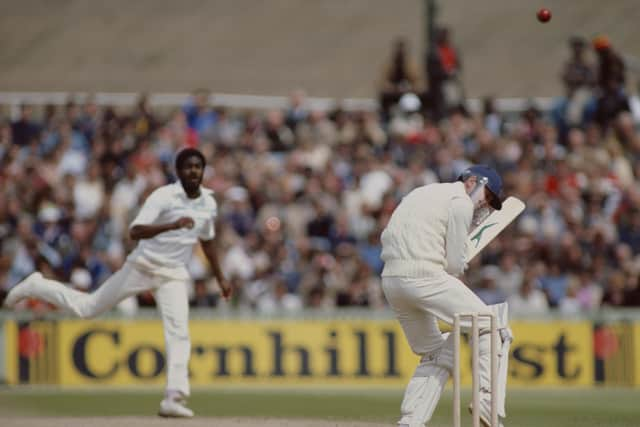

His emotive new book Why We Kneel, How We Rise is, arguably, one of the most important in the history of sport and follows Holding’s four-minute monologue on Sky Sports about the endurance of racism as footballers started taking the knee before matches.
Never has a rain break at the cricket been so profound – within minutes Thierry Henry, the mercurial footballer, was the first of many global sporting superstars to make contact. The author’s mild irritation is coverage of last week’s book launch focused unduly on the celebrity aspect of his interviews with Henry, Usain Bolt, Naomi Osaka and others rather than his desire to help educate society.
“The stories are important but that’s not the objective,” he says. “Changing society, not sport. Exactly... I know when I was growing up I was taught a lot of lies, half truths, lies and innuendos being put forward as facts.”
Advertisement
Hide AdAdvertisement
Hide AdExamples? He cites Jesus Christ “the image that they give of Jesus Christ, pale skin, blonde hair, blue eyes. Where Jesus came from, who in that part of the world looks that way? Again that is brainwashing, this is to show the image of perfection”. Impassioned, Holding talks about how the achievements of African origin people have been downplayed – notably Lewis Howard Latimer who is unrecognised for inventing the carbon filament used in light bulbs because it detracts from the established narrative about Thomas Edison. He goes on: “A black man (Garrett Morgan) invented the three-way traffic light – who knows that?”
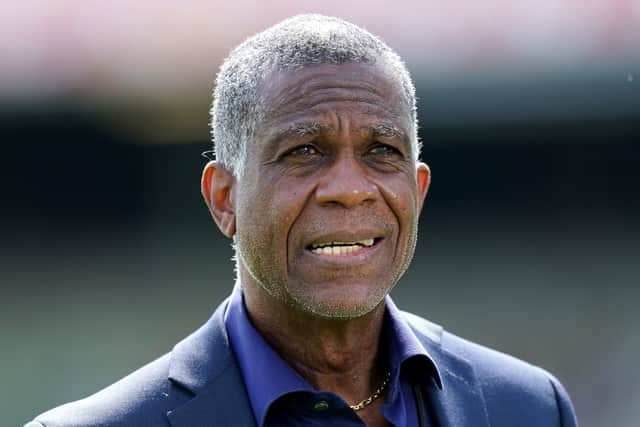

He is speaking from his Newmarket home after watching trainer Sir Michael Stoute’s horses on the gallops. He’s been too busy to study the entries, but – correctly – tips Hurricane Lane to win that afternoon’s Irish Derby.
I wonder if he was watching the previous evening’s Twenty20 international on television – or the sentencing of policeman Derek Chauvin for the murder in Minneapolis of a defenceless George Floyd that energised the Black Lives Matter movement. “Neither,” he replies. “There was no cricket on TV last night. Not proper cricket. And I don’t have interest watching the sentencing of a murderer.”
Instead, Holding says, he wants the past to shape the future with a balanced curriculum in schools. “Achievements of black people, and people of colour, have never been taught,” he laments.
Advertisement
Hide AdAdvertisement
Hide AdWhose fault – families, schools, society or politicians? “You hit the nail on the head right there. They (politicians) are the ones that set policy. They are the ones who decide curriculum at school.
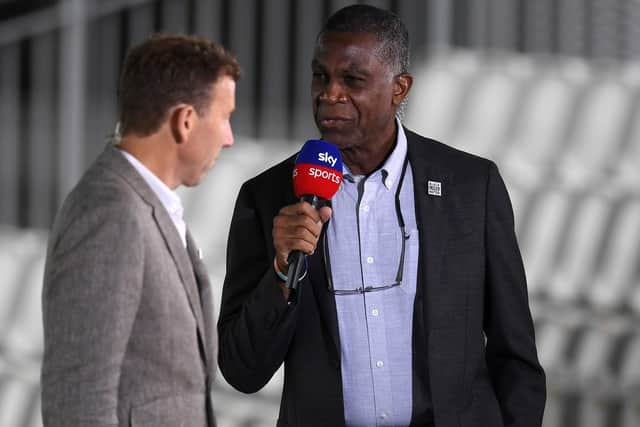

What should they take from the book? “To change the curriculum and way history is taught so people can understand we are all human beings so there is no superior race and no inferior race.”
Would he meet Boris Johnson and other leaders? “Tom, they wouldn’t even want to talk to me.” That’s depressing? “All they have to do is fix it, but they won’t.”
Why not? “Because they don’t want to change the narrative of white superiority – that is how they conquered the world. They had to make people feel inferior so they could dictate. You can’t rule over equals, only over inferiors. But I hope the public will recognise what’s happening and put enough pressure on the policy-makers because it is the public who vote, the public who put pressure on people to make changes.”
Advertisement
Hide AdAdvertisement
Hide AdNow 67, Jamaica-born Holding is in awe of the ‘‘activism’’ of tennis superstar Naomi Osaka, and how she’s used her status to highlight racial injustice, and that Wimbledon is much poorer for her absence as she struggles to come to terms with her new-found fame. It is why he, and Osaka, both cite a lack of education and empathy as being key factors at the heart of this societal struggle, and why sport is so influential. Significantly Holding’s own mother Enid, one of the book’s unsung heroines, was a teacher – and so, too, are many of his relatives.
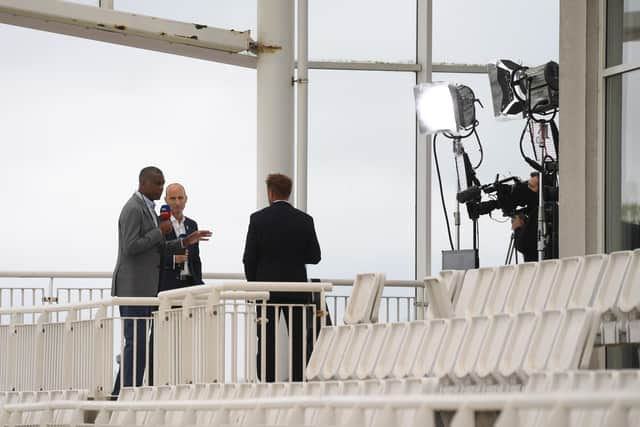

He’s hard on himself in the book about why he did not speak out more during his sporting career – “I was selfish” – but blunter now. “If I had spoken up, if I had taken action, if I had done anything in those early days of my career, I wouldn’t have had such a long career. The entire atmosphere around the world has changed. Racism hasn’t gone – but people now feel they have the right to talk which they didn’t 20, 30 or 40 years ago.”
He’s also very candid about the racism encountered at grounds like Headingley in an era when there was racial unrest on Britain’s streets. “It didn’t worry me. When I was playing, I didn’t worry about it. I knew I was going home. I didn’t have to live it,” he said. “If I had lived in England, it would be a different matter. My mother accosted someone at Headingley once because of something the person shouted at the stands. My mother said ‘Nah, you can’t say that to my son’. Afterwards, I heard about it. She left her seat and went to the man and said ‘Who are you talking to like that?’
“That’s my mother because she lived it. Her family disowned her from marrying a black man (Holding’s father Ralph). She was just brown skinned, she wasn’t white, she was half-caste as you would say in this country. She was a brown-skinned Jamaican.” He then pauses. “That was my mother.”
Advertisement
Hide AdAdvertisement
Hide AdToday Holding wants cricket to look at its soul over the future role that it can play. “You will see in the book what I’ve hinted at with regards to cricket. Cricket was used as a tool of colonialism and perhaps it is still lingering on with that sport,” he goes on. “That’s why we haven’t seen active participation with Black Lives Matter where cricket is concerned. Consciously or subconsciously, they seem they don’t want to get involved.”
This disappoints Michael Holding. It doesn’t surprise him. “It is a marathon,” he says. But he believes “we have got a chance” – the words used by his remarkable mother when she saw children of all races playing sport together in the street together. “If the book makes a small difference, that will be something that I’ll go to my grave feeling good about. That I have done something for mankind,” he adds.
Book cites Christopher Alder death in Hull police custody
THE death of a black former paratrooper in police custody in Hull is cited by Michael Holding in his new book.
“It is not just an American problem. Let’s get that straight early on,” he writes. “For George Floyd, read Christopher Alder who died in a police station in Hull in 1998.
Advertisement
Hide AdAdvertisement
Hide Ad“CCTV footage showed Alder lying face down on the floor, not moving and with his trousers around his ankles. Police officers are standing around laughing for 10 minutes while Alder, unable to breathe, dies.
“Five police officers were prosecuted for manslaughter and misconduct, but all were acquitted.”
Holding adds: “Black people account for eight per cent of deaths in custody but only three per cent of the population.”
Support The Yorkshire Post and become a subscriber today. Your subscription will help us to continue to bring quality news to the people of Yorkshire. In return, you’ll see fewer ads on site, get free access to our app and receive exclusive members-only offers. Click here to subscribe.
Comment Guidelines
National World encourages reader discussion on our stories. User feedback, insights and back-and-forth exchanges add a rich layer of context to reporting. Please review our Community Guidelines before commenting.